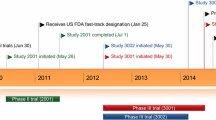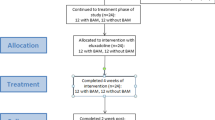Abstract
Eluxadoline (Truberzi®) is an orally administered, minimally absorbed agent that acts locally in the gastrointestinal tract as a mixed µ-opioid receptor agonist and δ-opioid receptor antagonist. The randomized, double-blind, placebo-controlled, multinational, phase 3 IBS-3001 and IBS-3002 trials examined the efficacy of eluxadoline in patients with diarrhoea-predominant irritable bowel syndrome (IBS-D). The composite response rate (i.e. the proportion of patients with improvement in both worst abdominal pain and stool consistency on ≥50% of days; primary endpoint), was significantly higher in patients receiving eluxadoline 100 mg twice daily than in those receiving placebo after 12 and 26 weeks’ therapy. Other abdominal and bowel symptoms (e.g. bloating, urgency, frequency of bowel movement) and health-related quality of life scores were also improved with eluxadoline. Eluxadoline was generally well tolerated in patients with IBS-D. Constipation was the most commonly occurring adverse event, although no serious constipation events were reported. Pancreatitis and adverse events consistent with sphincter of Oddi spasm were uncommon. In conclusion, eluxadoline is a new option to consider in the treatment of adult patients with IBS-D.

Similar content being viewed by others
References
Lacy BE, Mearin F, Chang L, et al. Bowel disorders. Gastroenterology. 2016;150:1393–407.
Lacy BE. Emerging treatments in neurogastroenterology: eluxadoline—a new therapeutic option for diarrhea-predominant IBS. Neurogastroenterol Motil. 2016;28(1):26–35.
Breslin HJ, Diamond CJ, Kavash RW, et al. Identification of a dual δ OR antagonist/µ OR agonist as a potential therapeutic for diarrhea-predominant irritable bowel syndrome (IBS-d). Bioorg Med Chem Lett. 2012;22(14):4869–72.
European Medicines Agency. Truberzi (eluxadoline): EU summary of product characteristics. 2016. http://www.ema.europa.eu/. Accessed 1 Feb 2017.
Wade PR, Palmer JM, McKenney S, et al. Modulation of gastrointestinal function by MuDelta, a mixed µ opioid receptor agonist/µ opioid receptor antagonist. Br J Pharmacol. 2012;167(5):1111–25.
Sobolewska-Włodarczyk A, Włodarczyk M, Storr M, et al. Clinical potential of eluxadoline in the treatment of diarrhea-predominant irritable bowel syndrome. Ther Clin Risk Manag. 2016;12:771–5.
Fujita W, Gomes I, Dove LS, et al. Molecular characterization of eluxadoline as a potential ligand targeting mu-delta opioid receptor heteromers. Biochem Pharmacol. 2014;92(3):448–56.
Levy-Cooperman N, McIntyre G, Bonifacio L, et al. Abuse potential and pharmacodynamic characteristics of oral and intranasal eluxadoline, a mixed µ- and κ-opioid receptor agonist and δ-opioid receptor antagonist. J Pharmacol Exp Ther. 2016;359(3):471–81.
Davenport JM, Hunt T, Dove LS. Eluxadoline has no effect on cardiac repolarization [abstract no. PII-017]. Clin Pharmacol Ther. 2016;99(Suppl 1):S79.
Davenport JM, Marbury T, Berg J, et al. Effect of hepatic impairment on eluxadoline pharmacokinetics [abstract no. PI-023]. Clin Pharmacol Ther. 2016;99(Suppl 1):S37.
Davenport JM, Covington P, Bonifacio L, et al. Effect of uptake transporters OAT3 and OATP1B1 and efflux transporter MRP2 on the pharmacokinetics of eluxadoline. J Clin Pharmacol. 2015;55(5):534–42.
Dove LS, Lembo A, Randall CW, et al. Eluxadoline benefits patients with irritable bowel syndrome with diarrhea in a phase 2 study. Gastroenterology. 2013;145(2):329–38.
Lembo AJ, Lacy BE, Zuckerman MJ, et al. Eluxadoline for irritable bowel syndrome with diarrhea. N Engl J Med. 2016;374(3):242–53.
Lacy B, Chey W, Lembo A, et al. Eluxadoline demonstrates efficacy for the treatment of irritable bowel syndrome (IBS) with diarrhoea (IBS-D) among multiple clinically relevant patient subgroups [abstract no. OC-070]. Gut. 2016;65(Suppl 1):A42–3.
Lacy BE, Chey WD, Cash BD, et al. Eluxadoline efficacy in IBS-D patients who report prior loperamide use. Am J Gastroenterol. 2017. doi:10.1038/ajg.2017.72.
Chey WD, Dove LS, Andrae DA, et al. Early response predicts a sustained response to eluxadoline in patients with irritable bowel syndrome with diarrhoea in two phase 3 studies. Aliment Pharmacol Ther. 2017;45(10):1319–28.
Cash BD, Lacy BE, Schoenfeld PS, et al. Safety of eluxadoline in patients with irritable bowel syndrome with diarrhea. Am J Gastroenterol. 2017;112(2):365–74.
Banks PA, Bollen TL, Dervenis C, et al. Classification of acute pancreatitis—2012: revision of the Atlanta classification and definitions by international consensus. Gut. 2013;62(1):102–11.
Fant RV, Henningfield JE, Cash BD, et al. Eluxadoline demonstrates a lack of abuse potential in phase 2 and 3 studies of patients with irritable bowel syndrome with diarrhea. Clin Gastroenterol Hepatol. 2017. doi:10.1016/j.cgh.2017.01.026.
Ford AC, Moayyedi P, Lacy BE, et al. American College of Gastroenterology monograph on the management of irritable bowel syndrome and chronic idiopathic constipation. Am J Gastroenterol. 2014;109(Suppl 1):S2–26.
Lacy BE, Moreau JC. Diarrhea-predominant irritable bowel syndrome: diagnosis, etiology, and new treatment considerations. J Am Acad Nurse Pract. 2016;28(7):393–404.
Quigley EMM, Fried M, Gwee K-A, et al. World Gastroenterology Organisation global guidelines irritable bowel syndrome: a global perspective update September 2015. J Clin Gastroenterol. 2016;50(9):704–13.
National Institute for Health Care and Excellence. Irritable bowel syndrome in adults: diagnosis and management. Clinical guideline. 2015. https://www.nice.org.uk/. Accessed 23 Mar 2017.
Cash BD. Eluxadoline: a promising therapy that raises many questions. Transl Gastroenterol Hepatol. 2016;1:76.
Buono JL, Carson RT, Flores NM. Health-related quality of life, work productivity, and indirect costs among patients with irritable bowel syndrome with diarrhea. Health Qual Life Outcomes. 2017;15(1):35.
Buono JL, Mathur K, Averitt AJ, et al. Economic burden of inadequate symptom control among US commercially insured patients with irritable bowel syndrome with diarrhea. J Med Econ. 2017;20(4):353–62.
McNeil Products Ltd. Imodium original 2 mg capsules: summary of product characteristics. 2016. http://www.medicines.org.uk/emc/medicine/23101. Accessed 23 Mar 2017.
Afghani E, Lo SK, Covington PS, et al. Sphincter of Oddi function and risk factors for dysfunction. Front Nutr. 2017. doi:10.3389/fnut.2017.00001.
Acknowledgements
During the peer review process, the manufacturer of eluxadoline was also offered an opportunity to review this article. Changes resulting from comments received were made on the basis of scientific and editorial merit.
Author information
Authors and Affiliations
Corresponding author
Ethics declarations
Funding
The preparation of this review was not supported by any external funding.
Conflicts of interest
Gillian Keating is a salaried employee of Adis/Springer, is responsible for the article content and declares no relevant conflicts of interest.
Additional information
The manuscript was reviewed by: B.D. Cash, University of Southern Alabama, Gastroenterology Division, Mobile, AL, USA; F. Mearin, Centro Médico Teknon, Institute of Functional and Motor Digestive Disorders, Barcelona, Spain; E. Rey, Hospital Clínico San Carlos, Division of Digestive Diseases, Universidad Complutense, Madrid, Spain; L.R. Schiller, Baylor University Medical Center, Division of Gastroenterology, Dallas, TX, USA.
Rights and permissions
About this article
Cite this article
Keating, G.M. Eluxadoline: A Review in Diarrhoea-Predominant Irritable Bowel Syndrome. Drugs 77, 1009–1016 (2017). https://doi.org/10.1007/s40265-017-0756-7
Published:
Issue Date:
DOI: https://doi.org/10.1007/s40265-017-0756-7




